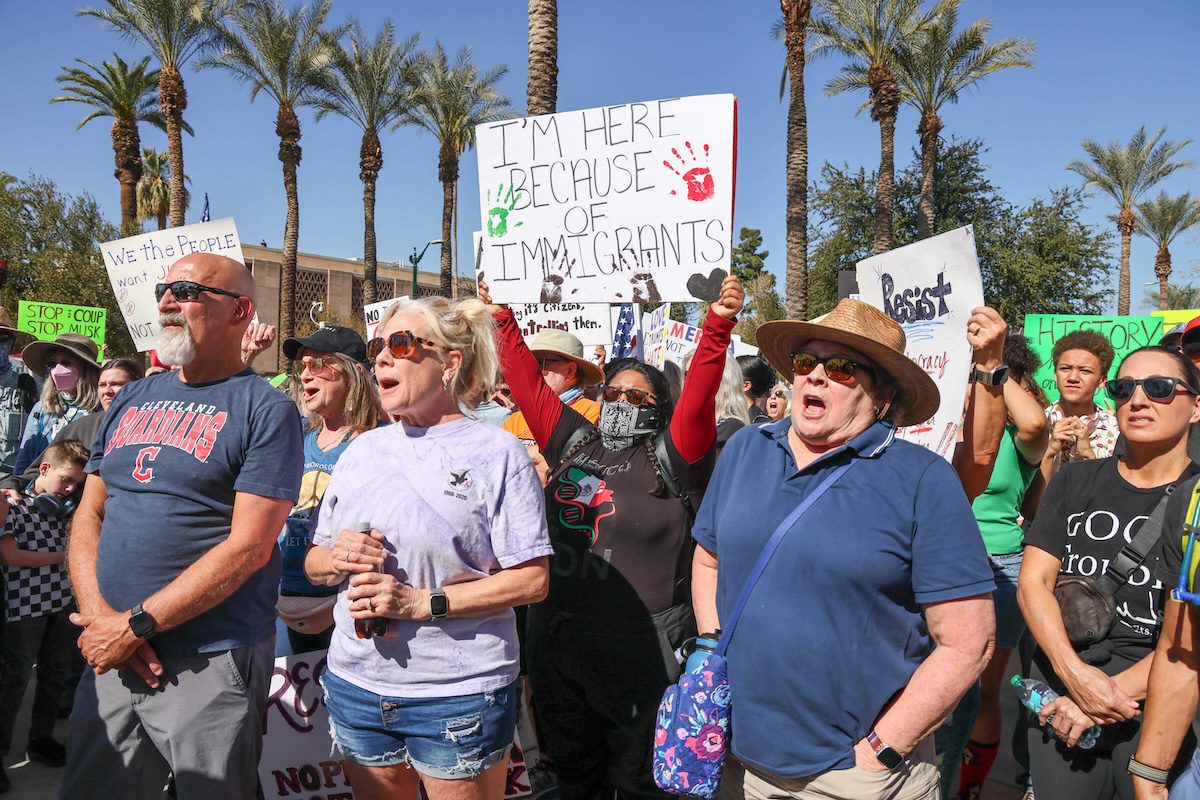
Hundreds of people gathered for the National 50501 Movement protest and march at the Arizona State Capitol Building in Phoenix, Arizona, on February 5th. The protest was part of a nationwide grassroots effort with 50 demonstrations across the United States, opposing the Trump administration's policies, including immigration actions. (Photo by: Alexandra Buxbaum/Majority World/Universal Images Group via Getty Images)
A proposal advancing through the Arizona Legislature would force public employees at places like schools and libraries to cooperate with immigration enforcement and betray the right to protect the privacy of anyone who walks through their doors.
Senate Bill 1164, dubbed the “Arizona ICE Act” and authored by Republican Arizona Senate President Warren Petersen, would prevent “political subdivisions” from passing ordinances that obstruct the federal government from enforcing federal immigration laws.
“We want to make sure that we are a partner [to the Trump administration] and not an obstacle,” Peterson said to the House Government Committee last month.
As outlined in the Arizona Constitution, political subdivisions are any government body that operates under the authority of the state, such as:
- School districts
- Fire departments
- Libraries
- Utility companies
- Public transportation
- Sanitary districts
- Maricopa County Special Health Care District
Under SB 1164, employees at any of these institutions would be tasked with aiding law enforcement in enforcing immigration laws, and would prevent them from enacting policies to protect their patron’s privacy and shield them from police probes.
Safety concerns ignored
Peterson dismissed concerns from House Democrats that the bill would have an adverse effect on immigrant communities—namely, preventing people from calling the police to report public safety concerns.
The bill was deemed constitutional by the Republican-controlled House Rules Committee on Wednesday and has been sent to the House floor.
David Rhodes, Yavapai County Sheriff and president of the Arizona Sheriff’s Association, said the bill does not order local law enforcement to engage in immigration enforcement. Instead, “it simply prohibits local governments and officials from making policies that would restrict [law enforcement’s] ability to keep communities safe and it would also require that law enforcement honor ICE detainers.”
For example, if law enforcement ordered public schools and libraries to check the documentation status of individuals before they enter, the Arizona ICE Act would prohibit the school or library, which are government entities, from making policies to prevent this.
READ MORE: Arizona’s Legislature is creating a climate of fear for immigrant families
Rep. Cesar Aguilar, D-Phoenix, said that high school students who came to lobby against immigration bills cried in his office out of the fear that their family could be deported.
“I tell them that I have a very similar story,” Aguilar said in a press conference. “Immigration came to my house to deport one of my parents, and it’s one of the most traumatic experiences that you can ever go through.”
Sen. Theresa Hatathlie, D-Coal Mine Canyon, said the law blurs the lines between local law enforcement and federal immigration authority.
“This dangerous dynamic undermines public safety for all Arizonans and allows wrongdoers to prey on vulnerable populations,” she said.
But what is most alarming, according to ACLU of Arizona lobbyist Noah Schramm, is the provision that prohibits any state or local government official, agency, or department from implementing any policy or practice that restricts cooperation with enforcement of federal immigration law.
The bill would also force other law enforcement agencies to prioritize immigration enforcement rather than other aspects of public safety—stating that they should use their “best efforts to support the enforcement of federal immigration law.
Republicans limit public comment
Of the six speakers that were present to speak against the bill, only three were allowed to testify before the committee.
Annie Lewis with Mormon Women for Ethical Government was one of the few able to speak in opposition to the bill. She named immigration raids in schools as one of the main concerns for her community.
Andrea Varela, organizing director at Rural Arizona Action, has been denied the opportunity to speak against the bill four times—and each time, public testimony has been limited to a handful of speakers.
“I would say that it’s targeted,” she said.
Constitutional and racial profiling concerns
The Arizona ICE Act would also require that law enforcement honor “ICE detainers,” which are a formal request from ICE to a local law enforcement agency to hold an individual for up to 48 hours beyond their scheduled release, allowing ICE to take custody for potential immigration proceedings.
This allows for individuals to be held on immigration detainers, even when they have not been charged with a crime—and individuals could be detained for extended periods based solely on their immigration status, violating their right to due process and resulting in people facing prolonged detention without clear legal grounds.
Immigration advocates have consistently said that the Arizona ICE Act would lead to racial profiling—and Trump’s mass deportation action already has resulted in Native Americans, college students, and people who look Latino, being targeted by immigration authorities.
Immigration-related horror stories have been unfolding across the country since President Trump took office.
More than a dozen Indigenous people in Arizona and New Mexico have reported being stopped at their homes and workplaces, questioned or detained by federal law enforcement, or asked to produce proof of citizenship during immigration raids since January 29.
In March, a Venezuelan man falsely accused of being a gang member was sent to a prison in El Salvador after being detained for six months at the Southern border when he was on his way to attend a prearranged asylum appointment in San Diego.
“This bill is SB 1070 in a new outfit,” said Rep. Quanta Crews, D-Phoenix, in a press conference. “It targets all people, Black, brown, immigrant families. It touches us all. It takes one officer to assume that you may not be of legal status, and off you go.”
Some communities disproportionately targeted
In rural areas, pockets of close-knit communities that heavily depend on one another could be disproportionately affected by laws like the Arizona ICE Act, Varela said.
People would be fearful to call law enforcement, and even community organizations that assist with other resources like utility, food, legal, or health care, for fear that it would bring authorities verifying documentation status—putting a mixed-status community at risk, Varela said.
Varela, who was born and raised in Casa Grande, said that rural communities also often rely on police for more than just public safety, and the Arizona ICE Act will erode that trust in law enforcement.
“If people fear that asking for help from law enforcement or local agencies could lead to deportation, they’ll hesitate to report crimes, seek medical care or even enroll their children in school,” Varela said. “This won’t make our communities safer, it will make them more isolated and vulnerable and make accessing critical resources exceedingly difficult.”
Sen. Catherina Miranda, D-Laveen, joined her fellow Democratic lawmakers in condemning the advancement of the proposal at a press conference.
“The rhetoric surrounding stricter immigration enforcement can foster divisiveness and fuel anti-immigrant sentiments,” said Miranda.
Entire communities could experience criminalization and be stigmatized based on immigration status, leading to discrimination and hostility, Miranda said.
“Even though we are assured that the governor will veto this, it’s very important that we still stay united,” Miranda said.
“I will keep showing up and speaking up because our communities, nuestras comunidades, our familias, our neighbors, our friends are under attack,” Varela said.
Support Our Cause
Thank you for taking the time to read our work. Before you go, we hope you'll consider supporting our values-driven journalism, which has always strived to make clear what's really at stake for Arizonans and our future.
Since day one, our goal here at The Copper Courier has always been to empower people across the state with fact-based news and information. We believe that when people are armed with knowledge about what's happening in their local, state, and federal governments—including who is working on their behalf and who is actively trying to block efforts aimed at improving the daily lives of Arizona families—they will be inspired to become civically engaged.


Trump bill may repay $196M Ducey spent to turn shipping containers into short-lived border wall
WASHINGTON – In 2022, Arizona spent $196 million on a border wall built by stacking about 2,200 shipping containers – about half to install it and...

ICE arrests at Phoenix immigration court an ‘all-out assault on due process,’ advocates say
When an Arizona mom arrived for a routine immigration check-in at the downtown Phoenix immigration court on Wednesday, she had no reason to believe...

Army control of border buffer zone may funnel migrants to tribal land in Arizona
WASHINGTON – Some Arizona border officials have welcomed President Donald Trump’s order for a military takeover at the U.S-Mexico border. But...

Fears of racial profiling swirl over registration policy for immigrants in the US illegally
PHOENIX (AP) — The Trump administration's plan to strictly require anyone illegally in the U.S. to register with the government and carry...





